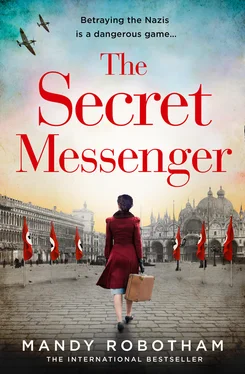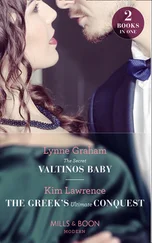I still remember that intense feeling when Armando Gavagnin activated the partisan cause in Piazza San Marco, raising his fist and standing tall on a table outside Florian’s, the oldest of Venetian cafés and a hot spot for age-old rebellion. My throat was dry as I listened to his calling on Venetians to fight, so fired up that I was ready to give up my job, ditch my skirt suits and don trousers and neckerchief, rifle in my arms. For Venice and Italy. For Popsa to be proud.
It was Sergio, the new leader of the Venetian brigade, who persuaded me otherwise back then, toning down my revolutionary fervour and persuading me I’d be more use on the inside, waging war with information. ‘You can be the mouse to outwit the large, predatory cat,’ he had phrased it, with his bushy eyebrows dancing a lifetime of mischief. ‘Bide your time,’ he advised me. ‘Without the likes of you we are an army fighting blind. We need your eyes and ears in the works department.’
His weathered, open face made me think of my grandfather in his younger days – so sure that we would triumph. Even then, Sergio made me feel like a soldier, albeit with heels and a handbag. Yet that romantic image of fighting for the cause has never left me. I want – I need – to make a difference. Perhaps now I can.
‘Lino’ speaks again, bringing me back to the moment. ‘Sergio also insists that you can say no if you want – we’re all aware how much you are doing right now.’
‘I’m fine,’ I say. ‘I can manage. What is it?’
‘You’ll be contacted on your next trip to the newspaper office on Giudecca in two days. There’s a job we need doing there, and, as you’re already back and forward frequently, it will raise less suspicion if it’s you.’
I leave soon after, despite the kitchen mama generously offering to share their evening meal. I’m hungry, but this is business, and ‘Lino’ deserves his privacy.
I walk home thinking how exhausted I am day to day. This new task is one more thing to draw on my senses, forcing me to be on constant alert. Yet I’m also excited as I walk the long stretch towards home at a pace. I know my contribution can never compare to some of the suffering or sacrifice in this war, and I want to do what I can, when I can.
The two days before my next visit to the newspaper cellar drag by. At times, my day job and the German translations appear turgid and unimportant, although I still have to feed the details via my regular contacts so the Resistance are able to further sift through the information. Cristian De Luca is largely absent and General Breugal is in a foul mood, barking orders and stomping about the office in frustration, upending trays of typewritten notes in a childlike temper.
I feel a sense of relief as I hit the cold, fresh air and cross the wide canal towards Giudecca, enjoying the roll of the boat and the slapping of the water against its sides. It’s tempered when a small German patrol boat cuts across us, sailors shouting over the engine’s throaty roar, making my insides swell along with the water. But what words I catch are nothing sinister, general chit-chat only, and I breathe again.
When I arrive, Matteo is at his usual place behind the bar, a few customers in front of him, but as I move to take off my coat he passes me a tied linen package.
‘My wife asks if you can take this to one of the nuns at Santa Eufemia,’ he says. ‘She’s laid up with a bad back.’ His tone is relaxed, as if it’s the most natural of favours to ask.
‘Of course,’ I say. ‘I won’t be long.’ Since Matteo has never before used me as a general messenger, I guess it’s something to do with my new Resistance task.
The wind whips up a spray as I walk along the waterfront towards the church and I pull the frayed wool of my coat closer. Santa Eufemia is an ancient building with a long history but, compared to some of the more notable churches in Venice, it’s rundown and slightly scruffy. The vast, vaulted space is empty of bodies as I enter through the scratched doorway, but warm compared to outside. I make the sign of the cross, take a seat in a front pew, and wait. When there are no other instructions, you simply wait. There’s lots of meandering and staring into space when you’re a Staffetta.
I consider taking this opportunity to pray – it would please Mama certainly. But I have never been especially religious and the war, with its stories of families being torn apart, severe beatings for no apparent reason than thought crime against fascism, has taken what faith I had left. I wonder if it will ever come back to me.
I barely hear the soft footsteps of someone approaching, only sensing the gentle waft of her habit as a nun approaches. She comes and sits next to me.
‘Evening Sister,’ I say. ‘I have something for you.’ I offer up the parcel, and she smiles and rises.
‘Come,’ she says.
We move behind the altar, through the vestry and beyond into a corridor, the air colder as we step into an open walkway behind the church. On the opposite side of the small garden is an old brick building that looks like a storeroom, with just two blacked-out windows above head height. The nun gets out an old key from under her habit, so big it looks almost theatrical. She unlocks the door, glances left and right, and ushers me in. There’s a glow from a candle in one corner, and from the gloom nearby I hear a single cough. A shifting movement seems to disturb the combination of soap and disinfectant, plus the musty, aged smell all such buildings have.
‘Sister Cara – is that you?’ a voice croaks.
‘I’ve brought you a visitor,’ the nun says, and there’s some more shuffling, although no one approaches.
‘You’ll have to go to him,’ she says to me. ‘He can’t get up.’
She brings another candle and sets it down on an upturned wooden box acting as a table. The cast of light outlines a man, his well-worn, dark clothes peeking out from under a rough woollen blanket. His face is grimy, and in his hairline are crusts of dried blood he hasn’t managed to wash away. Out of the bottom of the blanket sticks a limb, braced with wooden struts and heavily bandaged, a loose old sock unceremoniously stuck over his toes.
‘Welcome to my humble abode,’ the man says in Italian, and there’s a grimace as he tries to haul himself into a sitting position on the old metal bed.
‘No, no don’t move!’ I say in alarm. I pull up a wooden box that looks hardy enough and sit on it. He extends a hand from his half-sitting, half-lying position. Less grimy but not clean.
‘Pleased to meet you,’ he says, breathing heavily with the effort. ‘It’s nice to have a visitor. Thank you for coming.’
His Italian is faultless but his accent is strange – foreign perhaps? There’s a small pause during which we simply size each other up. He is handsome under the fresh scratches around his high cheekbones and forehead, dark and with full lips. He looks Italian, but that accent …
A boat horn honks outside and breaks the spell.
‘So, I’ve been told you need some help,’ I say.
He laughs good-naturedly, despite his obvious discomfort. ‘Yes, clearly wasn’t as good a parachutist as I thought.’ And he looks down at his prostrate leg. ‘Well and truly broken.’
He was part of an Allied parachute mission, he explains, designed to drop in radio sets for dispersal across the north of the country, allowing the partisans vital links with the outside world. There are unknown numbers of Allied soldiers still stranded after the Nazi invasion without any contact, as the Germans cleverly suspended all Italian radio communications when they occupied the country in September ’43. Since then, we in Venice have relied heavily on Radio Londra, the BBC’s daily broadcast to Italians, to bring us coded messages about partisan and enemy movements. But Radio Londra is reliant on a good radio signal and we know the fascists have spent millions of lira on jamming equipment to prevent such dispatches reaching us. Even a small network of radios would improve communications between the Allies and the Italian Resistance, but they are of little use lying dormant in this church.
Читать дальше












